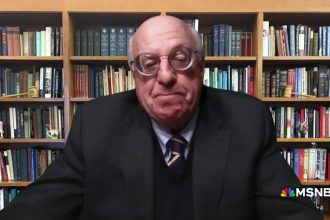A Texas university system sent a letter Thursday to all of its university presidents instructing faculty to “comply” with President Donald Trump’s executive order that there are only “two human sexes: male and female.”
“As a system, our role is to provide clarity and guidance to administration, ensuring that each university fulfills its legal obligations,” Texas Tech Chancellor Tedd L. Mitchell wrote in the letter. “I appreciate your continued diligence in reviewing course materials, curricula, syllabi, and other instructional documents and following established procedures to make timely adjustments where needed.”
The letter cites Trump’s January executive order that says there are only two sexes, and Texas Gov. Greg Abbott (R)’s January letter telling state agency heads to follow state and federal law and Trump’s executive order. It also cites House Bill 229, which was signed into law in June and states that “males and females possess unique immutable biological differences,” like “males are, on average, bigger, stronger, and faster than females.”
Mitchell writes in the letter that faculty “must comply with these laws in the instruction of students, within the course and scope of their employment.”
Texas Tech did not immediately respond to a request for comment on what this means exactly, but a spokesperson told The New York Times that administrators were “working to provide further clarification” of the chancellor’s letter.
One professor in the Texas Tech University system spoke to The New York Times on the condition of anonymity and said that they were “emotionally shellshocked” over the letter.
“What does it say about academic freedom? It says we don’t have it,” the professor said, according to the New York Times.
The letter also refers to “recent developments at universities across Texas” that “have highlighted the importance of understanding these compliance obligations,” seemingly referencing what happened at Texas A&M earlier this month when the university fired an instructor and removed a dean and department head from their administrative duties after a video went viral of a student accusing the instructor of teaching “illegal” material on gender and sexuality.
In the video, the instructor tells the class something about “remarks on gender and sexuality.” The student, who appears to be filming the interaction, tells the instructor that “according to our president, there’s only two genders,” and that anything else “very much” goes against her religious beliefs.
After the video went viral, Abbott encouraged the university to fire the instructor.
In a statement at the time, Texas A&M President Mark A. Welsh III said that he had learned that a children’s literature course had content that “did not align with any reasonable expectation of standard curriculum for the course.”
On Thursday, the American Association of University Professors said in a statement that faculty at Texas universities are “facing unprecedented efforts to censor teaching, scholarship, and public speech.”
“Academic freedom is not just about protecting individual faculty; it is the foundation of quality in higher education and a democratic society,” the statement reads.
AAUP offered resources for faculty, including rights that faculty at universities have.
“Federal or state executive orders cannot curtail academic freedom,” AAUP said. “While executive orders may guide executive branch agencies, they cannot override the First Amendment’s protections for speech and academic inquiry.”
Mark Henson, vice president of advocacy and government affairs at The Trevor Project, a suicide prevention organization for LGBTQ youth, said in a statement to HuffPost that Mitchell’s letter sends a “harmful” message that trans and nonbinary Americans aren’t “valued, welcome or safe.”
“The Trevor Project’s research found that 49% of transgender and nonbinary young people in Texas seriously considered suicide in the past year, and 16% attempted suicide,” Henson said. “Further, 90% of LGBTQ+ youth in Texas reported that recent politics negatively impacted their well-being. Restricting classroom discussion of gender identity not only limits academic freedom, but also contributes to a hostile climate that puts already vulnerable students at greater risk.”









